Dell XPS 15 L521X: A Detailed First Look
by Jarred Walton on July 25, 2012 1:10 AM ESTDell XPS 15 General Performance
We start as usual with our general performance application benchmarks. We’re reaching the point where we now have quite a few notebooks in our updated Mobile Benchmark suite, and we’ve tried to select some reasonable comparison points. Given the preliminary nature of our benchmark results (i.e. potential for CPU and/or GPU throttling), we have not yet added the XPS 15 to Mobile Bench, but we will do so when we have a final release BIOS that addresses our throttling concerns. Here’s the list of laptops we’ll be using for our charts, along with a brief overview of their specs. The full specs for each laptop can be found in their respective reviews, which we’ve linked in the table below.
| Laptop Configuration Overview | ||||
| Laptop | CPU | Graphics | Storage | Battery |
| Acer Aspire V3-571G | Intel i7-3610QM | GT640M/HD4000 | HDD | 48Wh |
| Acer Aspire S5 | Intel i7-3517U | HD4000 | SSD | 35Wh |
| Acer TimelineU M3 | Intel i7-2637M | GT640M/HD3000 | SSD | 55Wh |
| AMD Trinity Prototype | AMD A10-4600M | HD7660G | SSD | 56Wh |
| ASUS N56VM (Prerelease) | Intel i7-3720QM | GT630M/HD4000 | HDD/SSD | 56Wh |
| ASUS G74SX-A2 | Intel i7-2630QM | GTX560M/HD3000 | SSD | 90Wh |
| Clevo W110ER | Intel i7-3720QM | GT650M/HD4000 | Hybrid (Seagate) | 62Wh |
| Dell XPS 15 (L521x) | Intel i7-3612QM | GT640M/HD4000 | Hybrid (SRT) | 65Wh |
| Razer Blade | Intel i7-2640M | GT555M/HD3000 | SSD | 60Wh |
| Sony VAIO SE | Intel i7-2640M | HD6630M/HD3000 | HDD | 49Wh |
| Toshiba P755D | AMD A8-3520M | HD6620G | HDD | 47Wh |
We have quite a few SSD-equipped laptops in our list, which will mostly influence PCMark results. The Dell XPS 15 we’re reviewing marks the first time—and certainly won’t be the last!—we’ve had a laptop arrive with support for Intel’s Smart Response Technology. Previously SRT was only available with the desktop Z68 chipset, but with the new Ivy Bridge Panther Point chipsets (see the chipset table at the bottom of our IVB Ultrabook review) laptops with 7-series chipsets (excluding the HM76) all support SRT. Dell uses a Samsung P830 32GB mSATA SSD for SRT caching, and we enabled the higher performing “Maximized” mode with write-back caching as opposed to the lower performing “Enhanced” mode with write-through caching. There is an increased risk of data loss in the event of hardware removal or failure, but HDD removal is highly unlikely to occur on the XPS 15 and in the case of hardware failure there’s already a high chance of data loss. (We always recommend users back up, and back up often!) Note that a system crash doesn’t cause data loss—the Intel BIOS hooks detect an improper shutdown with “unsaved” data in the SSD cache, and that data is then committed to the hard drive on the next boot—it’s actually quite slick.
The other hybrid storage solution that we’ve seen more often is Seagate’s Momentus XT, which has an 8GB cache that AFAIK only functions in write-through caching mode. Going forward, we’ll also see some laptops using alternative caching schemes like Diskeeper/Condusiv Technologies’ ExpressCache software. I do have a laptop undergoing testing right now with an 8GB ExpressCache implementation, and it appears to be less performant than a 32GB SRT cache, but given the discrepancy in SSD size it’s difficult to come to any firm conclusion at this point.
Now let’s get to the benchmark results, starting with PCMark. We ran the XPS 15 in both IGP and dGPU modes, as the presence/lack of Intel’s Quick Sync technology can have a sizeable impact on overall performance according to this metric. We’ve used the best score for each chart on previously testing laptops (e.g. IGP for the Computation results). The XPS 15 results are in green, with the similarly equipped Acer V3-571G results in yellow. We also have results for the ASUS N56VM/N56VZ prototype with both HDD and SSD (light blue) storage, so you can get a feel for the range of performance that the storage solution creates. Note that while the overall design is highly reminiscent of Apple’s current MacBook Pro 15, we do not have current MBP15 Boot Camp results—and anecdotally it appears there is very little cross shopping; people either want an MBP with OS X, or something else with Windows. If/when Anand or Vivek gets around to testing the latest MacBooks with Windows, we’ll add the results to Mobile Bench.
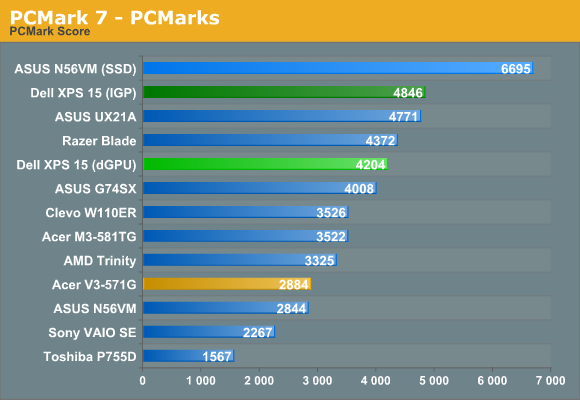
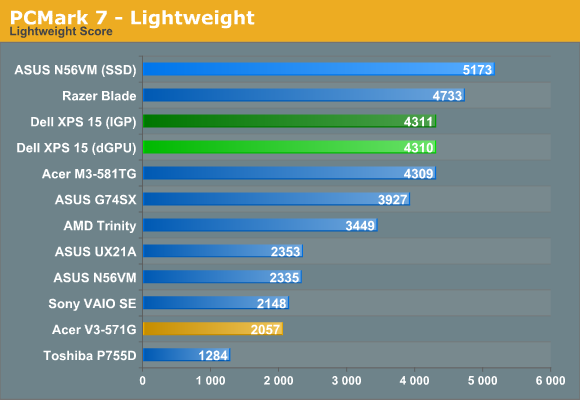
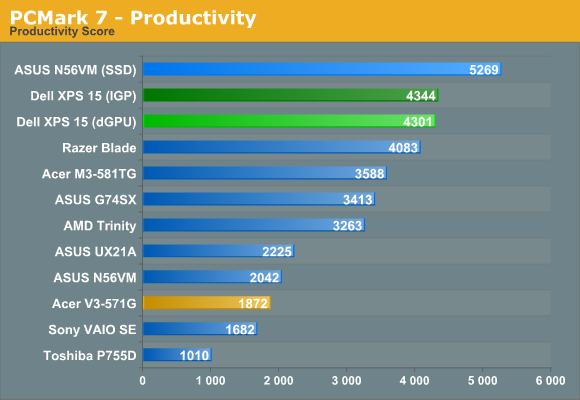
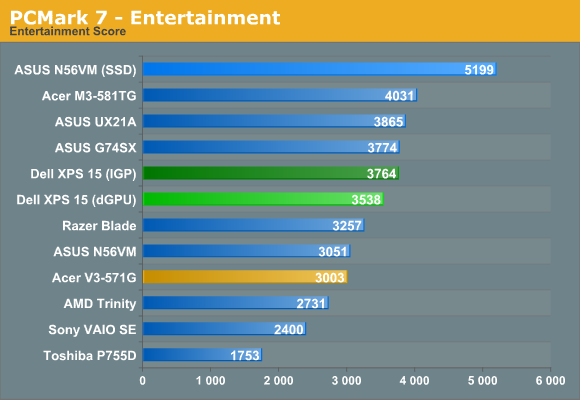
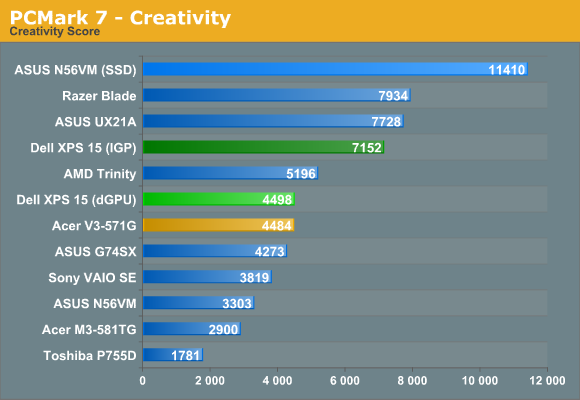
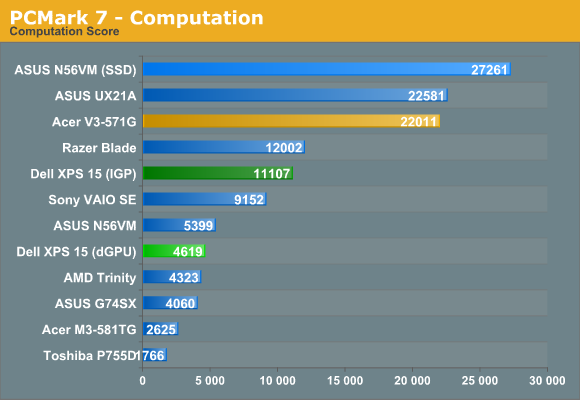
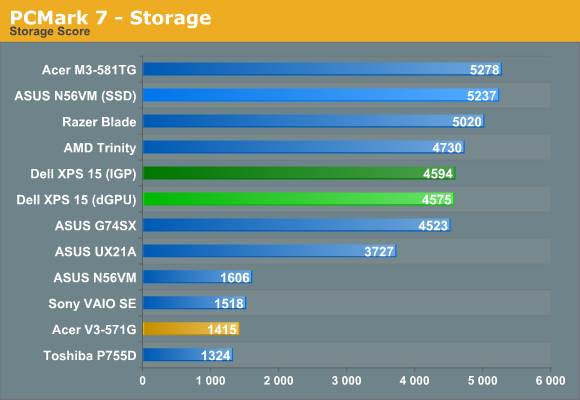
Starting with PCMark 7, our results are actually somewhat surprising. The hybrid Seagate Momentus XT storage in the Clevo W110ER doesn’t improve scores all that much over a typical hard drive (if you can call 25% “not that much”), whereas the 32GB SRT solution in the XPS 15 looks to improve performance by around 75% over an HDD. Of course, if you make the switch to a pure SSD solution (e.g. look at the N56VM scores), PCMark 7’s overall score improves by 135%. That pretty much establishes the expected storage hierarchy: SSD > HDD + SSD Cache > Hybrid HDD > HDD.
There are a few other oddities in the PCMark 7 results worth noting. Both the Creativity and Computation suites benefit tremendously from Intel’s Quick Sync technology. For whatever reason (we tried both the 2696 and 2761 Intel drivers, with similar scores in both cases), the XPS 15 results don’t seem to be in line with other Ivy Bridge laptops. In particular, note how the other three IVB laptops (N56VM, UX21A, and V3-571G) all post Computation scores in excess of 20000, while the XPS 15 has to “make do” with a score of only 11000. This may be yet another instance where throttling is affecting the results, so we’ll wait for updated firmware before trying to draw any final conclusions.
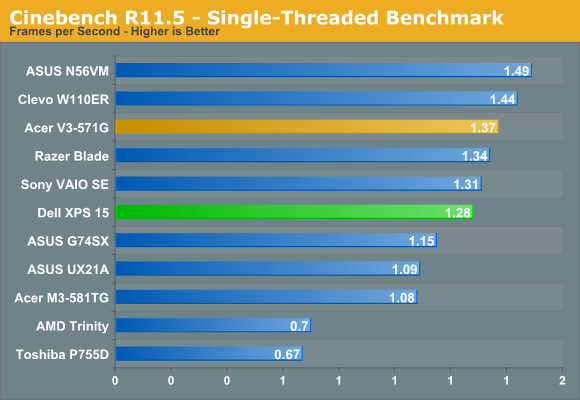
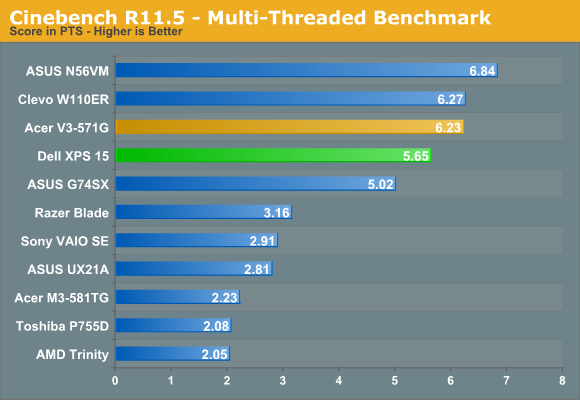
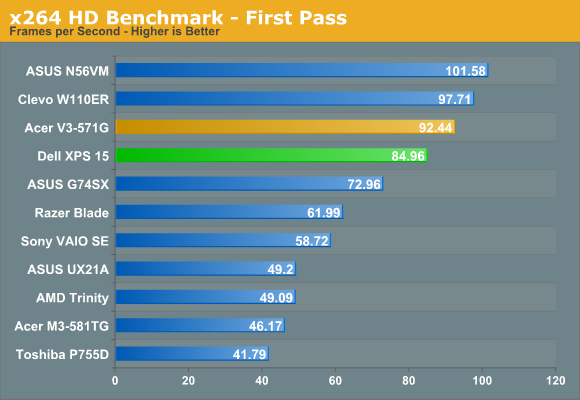
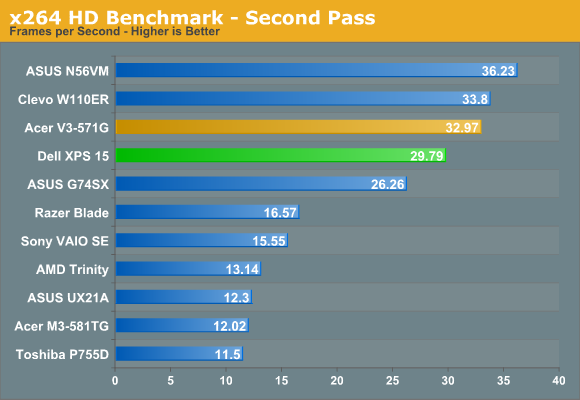
Our CPU-centric tests put the XPS 15 and its 35W i7-3612QM right about where you’d expect. It’s faster than any dual-core processor and outperforms the quad-core Sandy Bridge chips, but it’s a slight step down from the standard voltage 45W IVB quad-cores. Throttling of CPU clocks did not occur during these tests, so it’s only when the CPU and GPU are carrying a significant load the throttling is triggered. As far as we can tell, with the current A04 BIOS, the Dell XPS 15 can pretty much loop a workload like the Cinebench SMP test indefinitely and remain at the maximum Turbo Boost clock (though that may change with updated firmware).
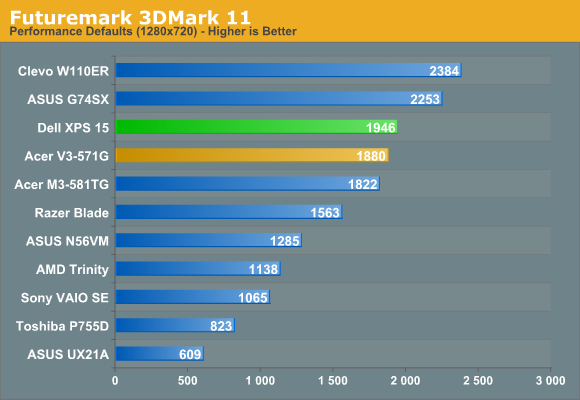
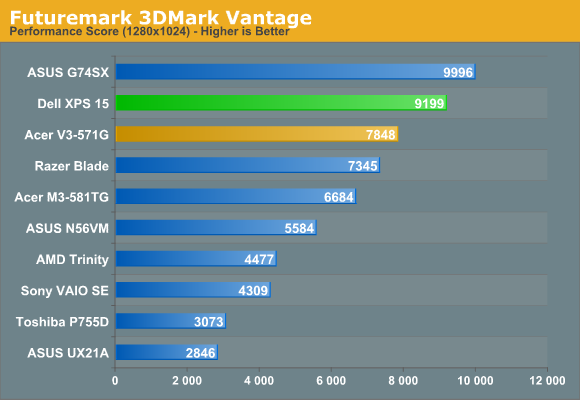
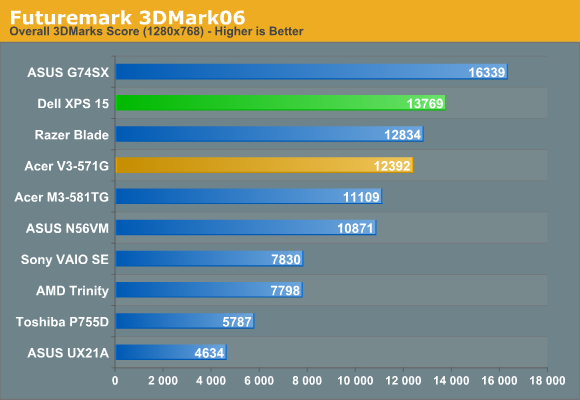
3DMark results also put the XPS 15 and its GDDR5-equipped GT 640M right where you’d expect. It’s a step up in performance over the DDR3-equipped GT 640M in the Acer V3-571G, and it also beats the previous generation GT 555M in the Razer Blade. Meanwhile, the GTX 560M can still win in our synthetic graphics tests, and the GT 650M with GDDR5 also outperforms the XPS 15. There are no real surprises here, but as noted several times already, throttling may be affecting these results—and it’s definitely a factor in the gaming results, which we’ll get to next.










109 Comments
View All Comments
CeriseCogburn - Sunday, July 29, 2012 - link
Looks like the truth is less than half on not so old macshttp://www.ebay.com/itm/Mac-Book-Pro-17-2-3Ghz-i7-...
BillatDell - Wednesday, July 25, 2012 - link
Very fair review, all things considered, Jarred. Thank you very much. I am the Dell employee you linked to out on Notebook Review Forums.I am wondering if skin temps matter to you and the Anandtech audience. I'd be curious to see a skin temp comparison under similar loads between the XPS and any competitive system, particularly the rMBP and MBP. It may not have any impact on anyone's buying decision if they don't see the numbers, but it may or may not matter to others if there turns out to be a wide disparity. Hard to tell if the cost/benefit analysis of our having a hard set skin temp spec across the board for all platforms stands to reason, given pretty much universal approval of how the MBP performs and the obvious lack of popularity with our current thermal/throttling scheme.
Anyone else have any thoughts on skin temps, or is it a non-factor? I'm interested to hear and get some thoughts out here on the record.
Great community. Great site. Thanks for all you do.
yyrkoon - Wednesday, July 25, 2012 - link
If I understand what you mean by "skin-temps" Bill. No for me personally it does not matter. The laptops I use currently serve as desktop replacements. As we are completely off-grid using solar, wind, and sometimes generators.However, I would admit. That we are not the norm for most users.
My own personal concerns are getting what I paid for but, stability first. Just for example. I like to play a lot of games, but have many computer related hobbies. So gaming performance for me tends to be my own benchmark. Of course I also have a price range I tend to stick within.
Unfortunately for me, and Dell. The XPS series is generally out of my own price range. However that could change. With that said, I have been keeping an eye on your companies products. Specifically the XPS mobile line.
JarredWalton - Wednesday, July 25, 2012 - link
Hi Bill, glad to have you on here. Skin (surface) temperatures are something I used to report, but them my thermometer broke and we added a couple more laptop reviewers and I figured I would just forget it and use internal temperatures. What I'd REALLY love to get is one of those digital thermal imaging cameras, but sadly they're a bit too much for me to convince Anand to buy a couple.As for what I think of skin temps, there's a balance that needs to be maintained, and certain areas can get hotter without bothering the user as much. If we're looking at a desktop replacement, it's not too big a concern, but for the more portable systems I definitely feel it's important. Ideally, I want the palm rest, keyboard, and the bottom "thigh" areas to be cooler, while the rear of the laptop (e.g. where the vent is on the XPS 15) can be hotter. 35C or less is generally what I'd like, but I live in WA so temperatures aren't as hot as, say, AZ or CA. If I were living in a hotter climate, I'd probably want even cooler running laptops.
Anyway, as you can probably glean from the review, I'd say you need stability as well as the ability to hit the rated performance on all parts. For the CPU, that means CPU clocks of 2.1GHz or higher regardless of workload should be possible pretty much indefinitely--and certainly if you're in a 75F or cooler environment. If the heatsink/fan can't keep the CPU and GPU at acceptable temperatures under load, then the hardware has been over-specced for the cooling. (We saw this exact same issue on Acer's TimelineX 3830TG, incidentally. Thin and light with reasonably fast hardware, but with gaming workloads the CPU would drop to 1.2GHz.)
My one thought that I keep coming back to on the XPS 15 is that it simply needs a higher RPM fan. Maybe the BIOS can kick the fan speed up one more level, but right now it just doesn't seem capable of cooling effectively at the current maximum RPM. A more drastic change would involve looking at the exhaust and trying to make that "breath" easier, as right now the bottom of the LCD/hinge seems to restrict airflow. Would either of these items be enough to fix the throttling problem? I don't know, but I am very surprised that this wasn't caught and addressed before retail units were shipping to the public.
Here's hoping we'll get a reasonable firmware fix in the near future!
Voldenuit - Wednesday, July 25, 2012 - link
OK, off the bat, I want to apologize for sounding like a broken record.But I was vocally unhappy with the Acer sporting a TN panel at $1400, and I'm even more unhappy with the Dell doing the same thing at $1700. What makes manufacturers think they could (or should) get away with foisting this sort of crap on people?
Next time I should just skip to the LCD page before reading any further. :/
Grok42 - Wednesday, July 25, 2012 - link
I agree. My preference of OS in order is Linux, Windows, BeOS, OS X. I also hate laptops as they are typically slower, hotter and cost more than a desktop. That said, as of today my next computer will probably be a rMBP because of the screen. My profession is computers and ~$1000 is nothing compared to what I will gain with a better tool with which to do my work. The PC industry better wake up and start offering multiple 4k displays or they are going to be wiped out.Doomtomb - Wednesday, July 25, 2012 - link
I like Dell and I want to see them succeed in the consumer/enterprise PC market. However, this review of the new 2012 Dell XPS 15 reminds me of the same niggles I had with my Studio XPS 16 purchased in early 2010. The one area that my Studio XPS 16 will always dominate is display (RGB-LED 1080p) displays colors perfectly unlike the XPS 15. Both of these computers are very premium products with price tags to match. The problems with the Studio XPS 16 were build quality (lousy hinges, seems between aluminum parts), heavy, battery life, and heat. It tries to push the boundaries between size, style, build quality, and performance but you can't have it all. It ended up being too big and heavy and just not quite as powerful as my friend's Alienwares. The battery life was also sub-par for class. I'd just rather recommend getting a thin and light, a gaming desktop replacement, or a MacBook with Retina Display.antef - Wednesday, July 25, 2012 - link
After the ridiculous overheating and throttling (to the point of an unusable machine) I've experienced with my Dell Precision, and reading this article with similar concerns, I can't imagine I'll be trusting a Dell for any high-performance workloads anytime soon.Death666Angel - Wednesday, July 25, 2012 - link
I was going to comment on how the MBP 15" gets mentioned in nearly every paragraph without being in the charts. Then I thought: "Well, they do have the Bench for those things." So I went there trying to compare this with the MBP 15" 2012. But you don't have the Dell there (yet) and you have no Apple 15" of any sort in there. How come? :-)tipoo - Wednesday, July 25, 2012 - link
Indeed, I'd like some macs on there